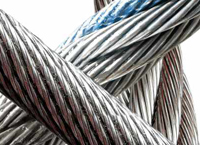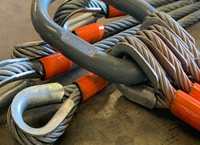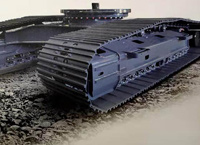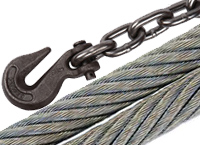Stud Bolt Iran
Cellphone / Whatsapp: +989122003350Stud bolts made in Iran are manufactured to meet the demanding requirements of industrial, petrochemical, and pipeline applications where high clamping force and long term reliability are critical. Iranian producers supply stud bolts in carbon steel and alloy steel grades such as ASTM A193 B7 and B16, as well as stainless steel options, ensuring excellent tensile strength, temperature resistance, and fatigue performance. Precision thread rolling, controlled heat treatment, and strict dimensional tolerances result in uniform load distribution and secure flange connections. With competitive pricing, customizable lengths and diameters, and compliance with international standards, Iranian made stud bolts offer a cost effective and dependable fastening solution for global energy, oil and gas, and heavy industry projects.
Carbon steel stud bolt of B7, B16 and L7 made in Iran
Carbon steel stud bolts of B7, B16, and L7 made in Iran are widely used in high pressure and high temperature industrial applications, especially in oil, gas, and petrochemical projects. These galvanized stud bolts are produced in accordance with ASTM A193 standards, offering high tensile strength, excellent load bearing capacity, and reliable performance under severe mechanical stress. Hot dip or electro galvanizing provides an additional protective zinc layer that significantly enhances corrosion resistance and extends service life in humid or outdoor environments. With precise threading, controlled heat treatment, and strict quality inspection, Iranian manufactured galvanized B7, B16, and L7 carbon steel stud bolts deliver a durable, cost effective, and internationally competitive fastening solution for demanding flange and structural connections.
Search Results For Stud Bolt| ajax-hex-bolt |
| Iran |
| 021-55429480 |
stud bolt B8M
The B8M stud bolt, manufactured according to ASTM A193 Grade B8M, is made from austenitic stainless steel Type 316 and offers excellent resistance to chloride and acidic corrosion. Its chemical composition includes 16–18% chromium, 10–14% nickel, and 2–3% molybdenum. In the annealed condition, it provides a minimum tensile strength of 75 ksi 515 MPa and a minimum yield strength of 30 ksi 205 MPa. The maximum surface hardness is 223 Brinell, and in certain cases, it can be supplied in a strain-hardened condition. B8M stud bolts are typically produced in diameters ranging from 1/4 inch to 2.5 inches with Unified 2A thread class.
The operating temperature range of the B8M stud bolt is from minus 200 to plus 550 degrees Celsius, making it ideal for use in chemical, pharmaceutical, and marine industries. Due to its high molybdenum content, it provides better resistance to chloride-rich environments such as seawater compared to B8 grade. Common applications include heat exchangers, chemical reactors, and process piping systems. These fasteners usually require no additional surface coating due to their inherent corrosion resistance. Quality control includes tensile testing, hardness testing, chemical analysis, and, when necessary, non-destructive tests such as PT or UT. B8M stu
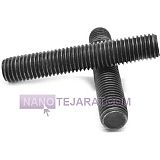
 | |
| ajax-hex-bolt | 021-55429480 |
| ajax-hex-bolt |
| Iran |
| 021-55429480 |
Steel stud bolt
Stainless steel stud bolts are made from austenitic or martensitic stainless steel and are designed for corrosive environments and varying temperature conditions. Their typical chemical composition includes 16 to 18 percent chromium, 8 to 14 percent nickel, and varying amounts of carbon and molybdenum. The tensile strength of these stud bolts usually ranges from 70 to 125 ksi approximately 480 to 860 MPa. Heat treatment involves annealing to maintain flexibility and, in some cases, tempering to increase hardness. The surface hardness of stainless steel stud bolts ranges between 200 and 300 Brinell, and common diameters are produced from 1/4 inch to 3 inches. Threads are manufactured according to ASME B1.1 standard with class 2A or 3A fits.
Operating temperatures for stainless steel stud bolts range from minus 200 to plus 600 degrees Celsius, offering stable performance and excellent corrosion resistance. Their main applications include oil, gas, petrochemical, food, and pharmaceutical industries. Surface coatings are generally unnecessary due to the inherent stainless properties of the steel. Quality control involves tensile testing, hardness testing, chemical analysis, and non-destructive tests such as PT and UT. These stud bolts are ideal for critical connections in industri
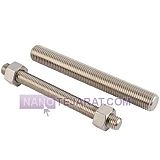
 | |
| ajax-hex-bolt | 021-55429480 |
| ajax-hex-bolt |
| Iran |
| 021-55429480 |
Steel stud bolt
Steel stud bolts are manufactured from carbon or alloy steel with precise chemical compositions including carbon, manganese, phosphorus, and sulfur, making them widely used in industrial connections. Depending on the grade, their tensile strength ranges from 60 to 150 ksi. Common grades like ASTM A193 B7 specify a minimum tensile strength of 125 ksi and a yield strength of 105 ksi. Threads are produced according to ASME B1.1 standard with 2A or 3A class fits and have very tight dimensional tolerances. Standard diameters range from 1/4 inch to 4 inches, and lengths can extend to several meters. Surface treatments such as black oxide or hot-dip galvanizing enhance corrosion resistance and durability.
Heat treatment for steel stud bolts includes quenching at 850 to 900 degrees Celsius followed by tempering around 600 degrees Celsius. This process improves hardness, fatigue resistance, and structural stability. Final hardness varies by grade, typically ranging from 200 to 350 Brinell or 24 to 35 Rockwell C. These stud bolts perform well in temperature ranges between minus 29 and plus 427 degrees Celsius. Quality control includes tensile testing, hardness measurement, chemical analysis, and, when required, non-destructive testing such as UT and MPI. Steel stud bolts play a critical
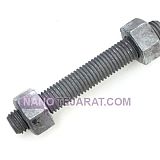
 | |
| ajax-hex-bolt | 021-55429480 |
| kianbolt |
| Iran |
| 021-55401057 |
Stainless steel stud bolt Carbon steel stud bolt
Stainless steel stud bolts are made from corrosion-resistant alloys such as 304 or 316, typically containing 18% chromium and 8–10% nickel. This composition ensures high resistance against corrosion, rust, and chemical exposure. Their tensile strength typically ranges from 75 to 100 ksi, and they can withstand temperatures up to 870°C. These stud bolts are manufactured in compliance with international standards such as ASTM A193 B8 or B8M. Threads are available in both metric and inch sizes, and the surface undergoes precise machining. Stainless steel stud bolts are ideal for use in corrosive environments such as petrochemical plants, food processing industries, and marine applications.
Carbon steel stud bolts are produced from alloy or high-strength carbon steel, usually hardened and tempered through heat treatment. They typically provide a minimum tensile strength of 125,000 psi and a yield strength of 105,000 psi. Main alloying elements include carbon, manganese, chromium, and molybdenum. These bolts are manufactured according to ASTM A193 B7 or DIN 975 standards. The surface is often coated with zinc galvanized or Dacromet to prevent corrosion. This type of stud bolt is widely used in oil, gas, steam, and high-pressure industrial applications, especially for flange an
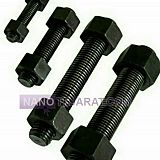
 | |
| kianbolt | 021-55401057 |
| ajax-hex-bolt |
| Iran |
| 021-55429480 |
stud bolt B16
The B16 stud bolt, manufactured in accordance with ASTM A193 Grade B16, is made from alloy steel with high chromium and molybdenum content, suitable for high-pressure applications. This stud bolt has a minimum tensile strength of 125 ksi approximately 860 MPa and a minimum yield strength of 105 ksi about 725 MPa. Its chemical composition includes up to 0.50% carbon, 0.80–1.10% chromium, and 0.15–0.25% molybdenum. B16 stud bolts are heat-treated by quenching and tempering, with a surface hardness ranging from 235 to 321 Brinell. Thread dimensions conform to ASME B1.1 with a 2A class fit and are available in diameters from 1/4 inch to 4 inches.
The operating temperature range of B16 stud bolts is from minus 29 to plus 593 degrees Celsius, making them ideal for high-temperature industrial applications. They are commonly used in power plant equipment, boilers, heat exchangers, and high-pressure steam lines. Surface finishes often include black oxide or hot-dip galvanizing to improve corrosion resistance. To ensure quality, tensile, hardness, and chemical analysis tests are conducted according to ASTM A193 requirements. Due to their high mechanical strength and thermal stability, B16 stud bolts are a reliable choice for critical connections in the energy and petrochemical indus
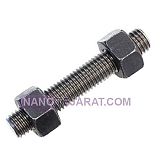
 | |
| ajax-hex-bolt | 021-55429480 |
| ajax-hex-bolt |
| Iran |
| 021-55429480 |
stud bolt B7
The B7 stud bolt is a threaded fastener made from chromium-molybdenum alloy steel ASTM A193 Grade B7, designed for high-temperature and high-pressure applications. It has a minimum tensile strength of 125 ksi approximately 860 MPa and a minimum yield strength of 105 ksi about 725 MPa. Its surface hardness ranges from 24 to 35 HRC and it is manufactured in various heat-treated classes. The B7 stud bolt typically features a Unified 2A thread and is paired with a 2H heavy hex nut. It is produced in accordance with international standards such as ASME B18.31.2 and ASTM A193, and is commonly used in oil, gas, petrochemical, and power generation industries.
The operating temperature range for a B7 stud bolt is from minus 29 to plus 427 degrees Celsius, ensuring reliable performance under extreme thermal conditions. It is available in standard diameters from 1/4 inch to 4 inches with custom lengths upon request. Surface finishes include hot-dip galvanizing or black oxide coating to enhance corrosion resistance. Dimensional tolerances are defined based on ANSI/ASME B1.1 standards. For critical applications, non-destructive tests such as UT or MPI are also performed. Due to its high strength and mechanical stability, the B7 stud bolt is recommended for high-pressure operational environ
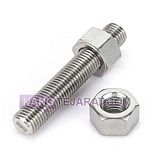
 | |
| ajax-hex-bolt | 021-55429480 |
| Ajax-bolt-nut |
| Iran |
| 021-55429480 |
Stud Bolt ASTM A 193 B16
ASTM A193 B16 stud bolts are made from alloy steel containing chromium, molybdenum, and vanadium, engineered to withstand high pressure and temperature conditions. This grade offers a tensile strength range of 860 to 1030 MPa and a yield strength between 690 and 860 MPa. Quench and temper heat treatment enhances both hardness and thermal resistance. The recommended operating temperature for B16 stud bolts reaches up to approximately 510°C. These bolts are manufactured in diameters from 1/4 inch to 2.5 inches, with either inch or metric threads. Thread types comply with UN or M standards and are typically used with ASTM A194 Grade 4 or 7B nuts.
The surface of B16 stud bolts is typically offered in black oxide, galvanized, or phosphate coatings to provide corrosion protection. The average density of the alloy is approximately 7.85 g/cm³, and its hardness ranges from 200 to 300 Brinell. Thread dimensional tolerances follow Class 2A standards to ensure maximum grip and structural safety. These stud bolts are used in assembling boilers, heat exchangers, high-pressure flanges, and turbines. The ASTM A193 B16 standard outlines precise chemical, mechanical, and performance requirements for high-pressure applications in petrochemical and power generation industries.
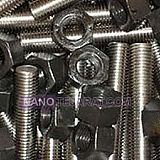
 | |
| Ajax-bolt-nut | 021-55429480 |
| generalsteel |
| Iran |
| 021-55412302 |
stainless steel stud bolt
Stainless steel stud bolts are manufactured from corrosion-resistant steel grades such as 304, 316, and 321. Their chemical composition includes approximately 18% chromium and 8–10% nickel. This alloy ensures structural stability at elevated temperatures up to 870°C. The tensile strength typically ranges between 515 and 860 MPa, while yield strength falls between 205 and 520 MPa. Threads are machined to metric or inch standards, with precise tolerance classes such as 6g or 2A. Most surfaces are plain and polished, although passivated or electroplated finishes may be used in specific applications.
Stainless steel stud bolts are engineered for corrosive environments such as refineries, chemical plants, and marine applications. They show excellent resistance to sulfuric acid, chloride, and salt-laden steam. These stud bolts are usually paired with stainless steel nuts like A194 Grade 8 or A2-70. In high-pressure flange systems, Grade 316 is preferred due to its molybdenum content, offering superior resistance to pitting corrosion. Surface hardness ranges from 150 to 250 Brinell, supporting ease of installation and creep resistance. Dimensions comply with ASME B18.31.2 or DIN 976 standards, ensuring compatibility across industrial systems.
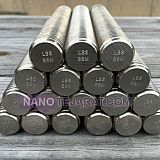
 | |
| generalsteel | 021-55412302 |
| ajax-hex-bolt |
| Iran |
| 021-55429480 |
Heat-resistant stud bolt
Heat-resistant stud bolts are made from special stainless steel alloys or nickel-chromium alloys to maintain mechanical and chemical stability at very high temperatures. These stud bolts have tensile strengths ranging from 80 to 140 ksi 550 to 965 MPa and a minimum yield strength of 40 ksi 275 MPa. Their typical operating temperature ranges from 600 to 1100 degrees Celsius, offering excellent resistance to oxidation and thermal corrosion. Standard diameters range from 1/4 inch to 2 inches, and threads are manufactured according to ASME B1.1 standards. Surface hardness varies between 250 and 350 Brinell, and they are capable of withstanding dynamic and impact loads.
In oil, gas, petrochemical, and power industries, heat-resistant stud bolts play a critical role in connecting high-temperature equipment. The manufacturing process includes specialized heat treatments like quenching and tempering to enhance hardness and fatigue resistance. Quality control involves tensile testing, hardness testing, chemical analysis, and non-destructive tests such as UT and PT. Using these stud bolts improves safety and equipment lifespan under severe thermal conditions and they are commonly employed in thermal systems, heat exchangers, and furnaces.
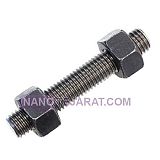
 | |
| ajax-hex-bolt | 021-55429480 |
| ajax-hex-bolt |
| Iran |
| 021-55429480 |
Galvanized stud bolt
Galvanized stud bolts are produced with a zinc coating thickness typically ranging from 50 to 100 microns to provide high resistance against corrosion and oxidation. These stud bolts are made from carbon steel with tensile strengths between 60 and 110 ksi approximately 415 to 760 MPa. Common diameters range from 1/4 inch to 2 inches with various lengths available, and threads are manufactured according to ASME B1.1 standards with class 2A or 3A accuracy. The galvanizing process can be hot-dip or electroplating, with hot-dip providing greater environmental resistance. Surface hardness after galvanizing typically ranges from 180 to 250 Brinell.
These stud bolts are widely used in oil, gas, petrochemical industries, and metal structure construction, especially in humid and corrosive environments. Quality control includes coating thickness testing, tensile testing, hardness testing, and non-destructive tests such as penetrant testing PT. Their corrosion resistance significantly increases the service life of connections and reduces maintenance costs. Using galvanized stud bolts in industrial projects improves safety and structural stability of metal frameworks.
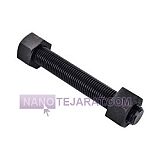
 | |
| ajax-hex-bolt | 021-55429480 |
| ajax-hex-bolt |
| Iran |
| 021-55429480 |
Dacromet stud bolt
Dacromet stud bolts are manufactured with a corrosion-resistant coating based on metallic and non-metallic compounds, typically 8 to 12 microns thick. This coating resists rust, acids, and corrosive chemical environments, thereby extending the service life of connections. Dacromet stud bolts are generally made from carbon steel with tensile strengths ranging from 70 to 110 ksi. Common diameters range from 1/4 inch to 2 inches, and threads are produced according to ASME B1.1 standards with high precision. Surface hardness after coating ranges between 200 and 280 Brinell.
Dacromet stud bolts are widely used in oil, gas, petrochemical industries, and metal structures requiring high corrosion resistance. The Dacromet coating process involves surface preparation, coating application, and heat curing, which enhance adhesion and durability. Quality control tests include coating thickness, tensile strength, hardness, and non-destructive testing. These stud bolts, with their special anti-corrosion properties, reduce maintenance costs and ensure connection stability under harsh environmental conditions.
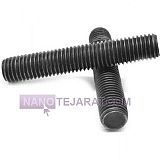
 | |
| ajax-hex-bolt | 021-55429480 |
| ajax-hex-bolt |
| Iran |
| 021-55429480 |
B7 steel stud bolt, size 5/8 inch and length 15 centimeters
The B7 steel stud bolt, size 5/8 inch and length 15 centimeters, is manufactured according to ASTM A193 standard. These bolts are made from steel with a temperature resistance of up to 450°C, making them highly suitable for flange and pipe connections. The thread diameter of 5/8 inch and length of 150 millimeters provide high mechanical strength in industrial working conditions. The hot-dip galvanized surface coating enhances corrosion and rust resistance, ensuring the durability of the connection in corrosive environments.
These stud bolts offer high tensile strength and optimized hardness to withstand mechanical pressures and heavy loads. The precise thread design allows easy assembly and disassembly without compromising connection quality. Grade B7 indicates a specific chemical composition and mechanical properties for stable performance at elevated temperatures. The galvanized B7 steel stud bolt, size 5/8 inch and 15 centimeters long, is widely used in the oil, gas, and petrochemical industries and fully complies with global standards.
.jpg?width=160&height=160&cropratio=160:160&image=/admin/uploads/استاد-بولت-فولادی-B7-B7-steel-stud-bolt-پیچ-و-مهره-آژاکس-5-u1097-70495f-New Project (28).jpg&url=/admin/uploads/استاد-بولت-فولادی-B7-B7-steel-stud-bolt-پیچ-و-مهره-آژاکس-5-u1097-70495f-New Project (28).jpg)
.jpg?width=300&height=300&cropratio=300:300&image=/admin/uploads/استاد-بولت-فولادی-B7-B7-steel-stud-bolt-پیچ-و-مهره-آژاکس-5-u1097-70495f-New Project (28).jpg&url=/admin/uploads/استاد-بولت-فولادی-B7-B7-steel-stud-bolt-پیچ-و-مهره-آژاکس-5-u1097-70495f-New Project (28).jpg) | |
| ajax-hex-bolt | 021-55429480 |
| ajax-hex-bolt |
| Iran |
| 021-55429480 |
Inch thread stud bolt
Inch-threaded stud bolts are typically made from carbon or alloy steel with tensile strengths ranging from 60 to 110 ksi. Their diameters vary between 1/4 inch and 2 inches, with diverse lengths available. Threads are manufactured according to ASME B1.1 standards in inch sizes, with precision classes of 2A or 3A. Surface hardness after heat treatment generally ranges from 180 to 240 Brinell. High mechanical strength and dimensional accuracy increase the service life and safety of industrial connections.
Due to their inch-thread design, these stud bolts are highly compatible with various nuts and industrial fittings. Their main applications include oil, gas, petrochemical industries, and metal structures requiring durable and precise connections. Quality control tests include tensile strength, hardness, and non-destructive testing like dye penetrant inspection to ensure product integrity. Inch-threaded stud bolts provide optimal performance under harsh environmental conditions because of their robust construction and strict standards.
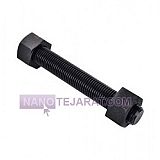
 | |
| ajax-hex-bolt | 021-55429480 |
| kianbolt |
| Iran |
| 021-55401057 |
B7 stud bolt
Grade B7 steel studs have a minimum tensile strength of 1050 MPa and a yield strength of 860 MPa, designed for high-pressure applications. This grade is made from chromium-molybdenum alloy steel, enhancing mechanical and thermal resistance up to 425 degrees Celsius. The thread diameter and stud length comply with ASTM A193 standards, with a surface hardness range of 240 to 280 Brinell. B7 studs can withstand high torsional and tensile loads and are widely used for pressure connections in the oil, gas, and petrochemical industries.
The manufacturing process of Grade B7 steel studs includes quenching and tempering heat treatments to achieve an optimal microstructure. This process ensures high hardness and strength, preventing premature failure. Additionally, precise control of dimensions and threads according to ASME B16.5 standards guarantees perfect compatibility with nuts and fittings. Using B7 studs increases the durability and safety of high-pressure connections, providing reliable performance under harsh environmental conditions.
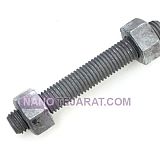
 | |
| kianbolt | 021-55401057 |
| ajax-hex-bolt |
| Iran |
| 021-55429480 |
Steel Stud Bolt B7 Size 58 Inch 10 Centimeters
The 5/8 inch steel stud bolt with a length of 10 centimeters is manufactured according to ASTM A193 standard and grade B7. These bolts are made from high-strength steel with a maximum temperature resistance of 450°C, designed for flange and pipe connections. The stud bolt has a thread diameter of 5/8 inch and a length of 100 millimeters, providing high mechanical strength in demanding industrial environments. The hot-dip galvanized coating enhances corrosion and rust resistance, ensuring a longer service life in humid conditions.
These stud bolts offer high tensile strength and suitable hardness to withstand mechanical loads and operational pressures. The thread design allows quick assembly and disassembly without damaging the connection quality. Grade B7 indicates a specific chemical composition and mechanical properties for stable performance at elevated temperatures. The 5/8 inch by 10-centimeter galvanized steel stud bolt is widely used in the oil, gas, and petrochemical industries and complies with global standards.
.jpg?width=160&height=160&cropratio=160:160&image=/admin/uploads/استاد-بولت-فولادی-B7-Steel-Stud-Bolt-B7--پیچ-و-مهره-آژاکس-5-u1097-31ec12-New Project (27).jpg&url=/admin/uploads/استاد-بولت-فولادی-B7-Steel-Stud-Bolt-B7--پیچ-و-مهره-آژاکس-5-u1097-31ec12-New Project (27).jpg)
.jpg?width=300&height=300&cropratio=300:300&image=/admin/uploads/استاد-بولت-فولادی-B7-Steel-Stud-Bolt-B7--پیچ-و-مهره-آژاکس-5-u1097-31ec12-New Project (27).jpg&url=/admin/uploads/استاد-بولت-فولادی-B7-Steel-Stud-Bolt-B7--پیچ-و-مهره-آژاکس-5-u1097-31ec12-New Project (27).jpg) | |
| ajax-hex-bolt | 021-55429480 |



